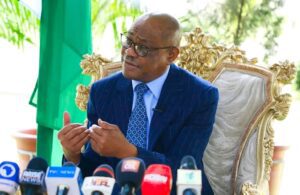Nigeria’s Rising Debt Dependence

IN just 20 months, Nigeria has secured N13.21 trillion ($8.6 billion) in loans from the World Bank alone, with an additional $2.2 billion in borrowing expected in 2025. While access to concessional loans can be a critical financial lever for development, the growing reliance on borrowings amid a rising debt profile—now at N144.67 trillion—raises concerns about debt sustainability and repayment capacity.
The 2025 federal budget tells a grim story. Of the N54.99 trillion budget, N14.32 trillion or 26 per cent is earmarked for debt servicing. This exceeds the outlay for recurrent expenditure (N13.64 trillion) and the combined allocation for health, education, agriculture, and social welfare.
While President Bola Tinubu claims that loans are needed for development, the speed, scale, and sustainability of Nigeria’s debt accumulation demand urgent scrutiny.
While it took eight years for Muhammadu Buhari’s administration to move Nigeria’s debt profile from N42 trillion to N77 trillion, Tinubu has doubled that figure in less than two years.
Nigeria’s debt-to-GDP ratio is approaching 40 per cent, a threshold that many economists consider risky for developing economies. This trend is not only fiscally dangerous but also unsustainable.
Despite assurances of development-driven borrowing, the disbursement and implementation of these loans do not give room for comfort.
According to the Lagos Chamber of Commerce and Industry, only 16 per cent of previously approved loans have been disbursed, raising serious questions about institutional capacity, transparency, and fund utilisation.
Equally troubling is the opacity surrounding Nigeria’s forward sales of crude oil. While this provides short-term liquidity, it undermines the country’s long-term fiscal sovereignty. With an estimated $21 billion of future barrels already sold, the country’s future has been effectively mortgaged.
This is a perilous gamble for an oil-dependent economy still grappling with the volatility of global markets. Oil prices tanked to a four-year low of $65.58 per barrel on Friday amid the United States-led global trade war.
Yet, there is a silver lining. The Nigeria Extractive Industries Transparency Initiative recently revealed that oil companies owe the government a staggering N9.33 trillion. This is enough to offset nearly 72 per cent of the projected N13 trillion budget deficit for 2025. The EFCC and NEITI must fast-track recovery efforts to trim the deficit.
The Tinubu administration must ensure that loans are utilised for tangible and measurable development initiatives. All loans must be tied to projects with direct economic returns: power, transportation, and digital access must be prioritised to enable private sector growth.
A project audit mechanism must be institutionalised to track the performance and impact of loan-funded initiatives.
The tax reforms must be implemented without overburdening citizens. The government should focus on broadening the tax base through digitisation, plugging leakages, and enforcing compliance. Efficient taxation can dramatically improve revenue without worsening the cost of living.
Rather than relying on more borrowings, the government should monetise state assets to free up cash. The NNPC is sitting on $370 billion worth of assets as of 2024. A partial privatisation through public listings can inject liquidity without incurring further debt. Transparent divestments would improve corporate governance in the national oil company and other entities.
Nigeria must develop a comprehensive debt management strategy that sets borrowing thresholds, imposes performance conditions on loan utilisation, and restricts future borrowing unless past loans are effectively deployed.
Debt is not inherently bad, but loans must be concessional, transparently disbursed, and aligned with a national development strategy anchored on productivity, job creation, and diversification away from oil.
The government should reduce its costs by merging or scrapping redundant agencies. The US, a $28 trillion economy, is doing the same under Donald Trump.
The Tinubu administration should shift from debt dependency to revenue mobilisation, enforce strict loan utilisation tracking, and halt the reckless forward oil sales.
Nigeria must avoid an unsustainable debt trap that will endanger future prosperity.





